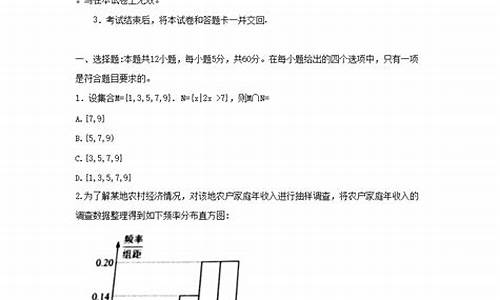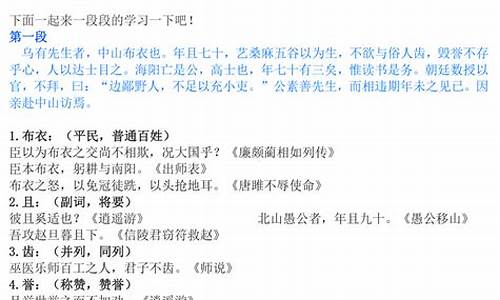of的短语高考-of短语合集
1.高考英语知识点考点总结归纳
2.高考英语语法: 介词短语用主动表被动的六种情形
3.容易混淆的高考英语词汇
4.高考英语特殊句式有哪些
5.求江苏英语高考常见的短语,最好是动词+介词的类型。
高考英语知识点考点总结归纳

高考正在紧张的备考阶段,高考英语的学习依然至关重要,不仅靠知识的积累和运用。接下来是我为大家整理的高考英语知识点考点 总结 归纳,希望大家喜欢!
高考英语知识点考点总结归纳一
高中英语实用常考 短语
首先,尤其重要的,最重要的 above all
偶然,无意中 by accident
对(于)…很积极 be active in
合计为 add up to
承让错误 admit one’s mistake
接受某人的建议 take / follow one’s advice
就…提出建议 give advice on
建议某人做某事 advice sb. to do sth.
后天 the day after tomorrow
毕竟;终究 after all
违心 against one’s will
在…岁时 at the age of
实现目标 achieve one’s aim
在空中;悬而未决 in the air
在户外,在露天里 in the open air
在机场 at the airport
火警 the fire alarm
满腔怒火 be filled with anger
因某人之言行而生气 be angry at sth.
生某人的气 be angry with sb.
通知 make an announcement
相继地,按顺序地 one after another
相互,彼此(三者或三者以上之间)one another
相互(指两者之间) each other
没有回答 give no answer
2.考试必备重点单词短语
形成…局面;产生 come into being
安全带 a safety belt
三思而后行。 Second thoughts are best.
尽力,尽最大的努力 do / try one’s best
尽量利用,善用 make the best of
一切顺利,万事如意 all the best
黑体地,粗体地 in bold
出身于农民家庭 be born in a peasant’s family
鞠躬 make a bow
动动脑子 use one’s brains
打破纪录 break the record
深吸一口气 take a deep breath
屏息;憋住气 hold one’s breath
上气不接下气 out of breath
刷牙 brush one’s teeth
突然哭起来 burst into tears
突然一阵大笑 a burst of laughter
要不是 but for
呼救声 a call for help
保持镇静(别慌) keep calm
保持安静(别吵) keep quiet
保持不动(别动) keep still
保持沉默(别说话) keep silent
夏令营 a summer camp
去 野营 go camping
情不自禁… cannot help doing
打牌 play cards
照顾,保管 take care of
医疗护理 medical care
anything but 一点也不
anything like 像……那样的东西
anywhere near 接近于
apart form 除……之外尚有
ly to 向……申请,适用于
reciation of 对……的欣赏
argue against 反对
as a result of 作为……的结果,由于
高考英语知识点考点总结归纳二
感叹句
感叹句:一般是用来表示说话时的喜悦、惊讶等情感。英语感叹句常用"what"和"how"引导,"what"和"how"与所修饰的词置于句首, 其它 部分用陈述句语序。
感叹词 修饰对象 感叹部分 主语 谓语+其他!
How(副词) 修饰形容词 How nice
How nice a girl the girl
she is!
is!
修饰副词 How well
How hard the boy
the workers Is swimming!
are working!
修饰动词 How
=what the flowers
How
=how fast She
she
he
he Loves the flowers!
loves!
runs!
runs!
What(形容词) 修饰单数可数名词 What a nice girl
=How nice a girl Jenny
Jenny Was!
was!
修饰复数可数名词 What nice girls They Were!
修饰不可数名词 What fine weather
what dirty water It
he Is!
drank!
感叹句的特殊形式
感叹句还可由陈述句、疑问句、祈使句,甚至一个词组及单词构成。例如: There was no face showing!
He’s such a nice boy!
The Great Wall is a magnificent building!
Isn’t it snowing heily!
Wonderful!
Nonsense!
Hy New Year to you!
Cheer!
高考英语知识点考点总结归纳三
强调句
1.强调句型用于强调陈述句;
2.强调句型用于强调一般疑问句;
3.强调句型用于强调特殊疑问句;
4.强调句型用于强调not…until…句型;
5.强调句型与状语从句、定语从句、祈使句的混合考查。
替代
1.do/does/did替代动词;
2.so和not分别代替肯定和否定的从句.
省略
1.主语的省略;
2.谓语或谓语的一部分的省略;
3.宾语的省略;
4.不定式的省略;
5.宾语从句和状语从句中的省略;
6.虚拟条件句中if的省略。
倒装句
1.部分倒装;
2.完全倒装
3.常考的几个重要句型:
So +be/情态/助动词+主语
Neither+be/情态/助动词+主语
So +adj/adv …+that …
Neither …, nor …
Not only …, but also …
Not until …
高考英语知识点考点总结归纳四
祈使句
一. 祈使句的句式特征
祈使句常常是表达说话人对对方的劝告、叮嘱、请求或命令等。因此,祈使句中一般没有主语,但根据其句意,实际上是省略了主语you。祈使句句末用感叹号或句号,朗读时,常用降调。在表达请求或劝告时,在祈使句前或句末可加, 上please,以使句, 子的语气更加缓和, 或客气。祈使句一般没有时态的变化,也不能与情态动词连用。例如:
Keep off the grass!勿踩草地!
Put the boxes in the small room.把那些盒子放到那个小房间里。
二. 祈使句的肯定句式
祈使句的肯定句式一般分为以下三种类型:
1. 行为动词原形+其他成分。例如:
Make sentences after the model.根据例句 造句 。
2. Be动词+其他成分(形容词、名词或介词短语等)。例如:
Be careful when crossing the street.过马路时要小心。
3. Let, +宾语+动词原, 形+, 其他, 成分, 。例如:
Let him go back now.让他现在回去吧。
三. 祈使句的否定句式
祈使句的否定句式,通常情况下在句首加上Don’t或Never,一般分为以下四种类型:
1. 在祈使句的肯定句式前加Don’t,构成“Don’t+行为动词原形+其他成分”。例如:
Don’t say that again!别再那样说了!
2. 在Be动词引起的肯定祈使句前加Don’t,构成“Don’t be+其他成分(形容词、名词或介词短语等)”。例如:Don’t be careless.不要粗心。
注意:在这种句型中be不能省略;否定副词not不可置于be之后。
3. Let引起的祈使句的否定形式有两种:(1)Let开头的祈使句,如果后面跟第一、第三人称名词或代词的宾格,可在Let前加Don’t,也可在Let后宾格的名词或代词后面加not。(2)如果以Let’s开头的祈使句,必须在Let’s后加not。例如:
Don’t let me go with her tomorrow. =Let me not go with her tomorrow.
不要让我明天跟她一起去。
Let’s not tell her the truth whenever we meet her.
无论什么时候我们碰到她,都不要告诉她真相。
4. 在公共场合的 提示语 中,否定祈使句常用“No+名词/V-ing形式”结构,表示“禁止做某事”。例如:
NO PHOTOS! 禁止拍照!
四. 祈使句的反意问句
祈使句的反意疑问句须按其 句子 结构及讲话人的语气来决定其疑问部分。通常有以下三种形式:
1. 祈使句为肯定句式,其反意疑问句表示请求时,通常用will you;表示邀请、劝说时,用won’t you。例如:
Be sure to write to us, will you?你一定要给我们写信,好吗?
Come to he dinner with us this evening, won’t you?
今晚来和我们一起吃饭,好吗?
2. 祈使句为否定句式,其反意疑问句通常只用will you。例如:
Don’t smoke in the meeting room, will you?
不要在会议室抽烟,好吗?
3. Let开头的祈使句构成反意疑问句时,除Let’s用shall we外,其他均用will you。例如: Let the boy go first, will you?让个那男孩先走,好吗?
Let’s take a walk after supper, shall we?
晚饭后我们去散步,好吗?
五. 祈使句的回答
祈使句的动作通常是表示将来发生的动作,所以回答祈使句时,一般用will或won’t。在回答具有否定意义的祈使句时,要注意两点:一是“形式一致”,即Yes与will保持一致;No与won’t保持一致。二是“意思相反”,即Yes是“不”的意思;No是“是”的意思。在回答时,要注意分析上下文语境中所提供的条件。例如:
--- Don’t go out, please. It’s raining heily outside.
请不要出去。外面雨下得很大。
---- Yes, I will. I he to meet my brother at the airport.
不行,我得去机场接我弟弟。
六. 祈使句与陈述句的并列使用
祈使句后接陈述句时,须用连接词连接。如果祈使句与陈述句表示的是一种顺承关系时,要用并列连词and来连接;如果祈使句与陈述句存在一种否定条件关系时,要用并列连词or来连接。例如: Lee it with me and I will see what I can do.
把它留给我吧,我想想有没有办法。
Hurry up, or we’ll be late.
快点,否则我们要迟到了。
七. 祈使句与条件状语从句的连用
祈使句与条件状语从句连用时,条件状语从句可置于祈使句前或后。例如:
Tell him to make a phone call to me if he comes here tomorrow.
如果他明天来这儿的话,叫他给我来个电话。
八. 祈使句的强调形式
祈使句的强调形式通常在肯定祈使句式前加上助动词Do(Do在句中无意义)。例如:
Do shut up!快住口!
九. 特殊形式的祈使句
在英语中,有些祈使句不是以动词原形来引起一个祈使句,而是以一个名词短语来充当,且后接一个带有并列连接词的分句。实际上,这个充当祈使句的名词短语相当于一个条件状语从句。例如:
More water and the young trees couldn’t he died. =If you had given them more water, the young trees couldn’t he died.
如果你给那些小树多浇点水,他们就不会死了。
十. 运用祈使句的误区
祈使句往往容易与不定式、分词或条件状语从句相混淆。在平时的练习或测试中,如果稍不留神,就会出错。因此,要认真审题,认真分析句子结构,并根据上下文语境,作出正确判断。例如:
___________ your composition carefully, some spelling mistakes can be oided.
A. Hing checkedB. Check
C. If you checkD. To check
析:如果空白处选填B(Check)项,则视为祈使句,但后一分句前没有并列连接词and连接;如选A或D项(分词或不定式),句中逻辑主语some spelling mistakes又不能执行这个动作,故均不符合句子结构。因此,只有C项(条件状语从句)符合句子结构及句意。
高考英语知识点考点总结归纳相关 文章 :
1. 高考英语知识点考点归纳
2. 高考英语知识点总结归纳
3. 高考英语知识点归纳整理
4. 英语高考知识点总结归纳
5. 高考英语知识点汇总大全
6. 高考英语知识考点汇总
7. 高考英语考点总结
8. 高考英语知识点归纳
9. 高考英语知识点总结
10. 高中英语知识点总结与归纳
高考英语语法: 介词短语用主动表被动的六种情形
高考英语语法:介词短语用主动表被动的六种情形
1、beyond+名词
The rumor is beyond belief. 这谣言难以置信。
The children were beyond control. 这些孩子不听管教。
注这类表达中的名词前通常没有冠词,且该名词一般都具有动作意义,类似的结构还有beyond compare(无可比拟),beyond description(难以形容),beyond (all) dou(毫无疑问),beyond expression(无法形容),beyond suspicion(无可怀疑),等。
2、in+名词
When was paper money in use in China? 中国什么时候开始使用纸币?
Please do not enter the classroom while a lesson is in progress. 上课时请勿进教室。
注这类表达中的名词前通常没有冠词,且该名词一般都具有动作意义,类似的结构还有 in action(在运转),in sight(看得见),in (good) repair(维修良好的),in store(贮藏着)等。
3、in course of+名词
The new railway is in course of construction. 新铁路正在兴建当中。
The goods ordered are now in course of shipment. 定的货正在运输途中。
注有些类似的短语有the表被动,无the表主动:
in charge of 负责 in the charge of 由…负责
in possession of 拥有 in the possession of 被…拥有
4、on+名词
The building is on fire. 那幢房子正在燃烧。
Every article on view will be on sale. 每件展品都将出售。
注这类表达中的名词前通常没有冠词,且该名词一般都具有动作意义,类似的结构还有on trial(在试用),on display(在展出),on show(在展出),on exhibition(在展出)等。
5、under+名词
The new music hall is under construction. 新的音乐大厅正在修建中。
Your proposal is under consideration. 你的提议正在考虑中。
注这类短语的名词前不用冠词,类似的还有under arrest(被逮捕),under attack(受到袭击),under discussion(在讨论中), under examination(在检查或调查中),under medical treatment(在治疗中),under repair(在修缮中),under review(在检查中),under study(在研究中)。
6、其他介词短语
除以上提到的几种情况外,还有一些介词短语也可表示被动意义,如for sale(供出售),for rent(供出租),at one’s service(听凭某人使用),above reproach(无可指责,无可非议),above suspicion(不受怀疑),above criticism(无可指责),within sight(看得见)等。
容易混淆的高考英语词汇
容易混淆的高考英语词汇大全
在高考英语中,有很多易混易错英语词汇,很多人都搞不懂!下面我整理了一些容易混淆的高考英语词汇,希望能给大家提供一些帮助。
1. clothes, cloth, clothing
clothes统指各种衣服,谓语动词永远是复数, cloth指布,为不可数名词 clothing 服装的总称,指一件衣服用a piece of, an article of
2. amount, number
amount后接不可数名词, number后接可数名词 a number of students
3. sound, voice, noise
sound自然界各种各样的声音,voice人的嗓音,noise噪音I hate the loud noise outside.
4. cause, reason
cause 指造成某一事实或现象的直接原因,后接of sth./doing sth,reason用来解释某种现象或结果的理由,后接for sth./doing sth. the reason for being late
5. exercise, exercises, practice exercise运动,锻炼(不可数),exercises练习(可数),practice(反复做的)练习 Practice makes perfect.
6. officer, official
officer部队的军官,official官员 an army officer
7. work, job
二者均指工作。work不可数,job可数 a good job
8. cook, cooker
cook厨师,cooker厨具 He is a good cook.
9. problem, question
problem常和困难连系,前面的动词常为think about, solve, raise,question常和疑问连系,多和ask, answer连用
10. a number of, the number of
a number of许多,谓语动词用复数。the number of…的数目,谓语动词用单数。The number of students is increasing.
11. chick, chicken
二者均可指小鸡,chicken还可以当鸡肉 The chicken is delicious.
12. trip, journey, trel, voyage
trel是最常用的,trip指短期的旅途,journey指稍长的旅途,voyage指海上航行 a three-day trip
13. in front of, in the front of
in front of范围外的前面,in the front of范围内的前面 In the front of the room sits a boy.
14. three of us, the three of us
three of us我们(不止三个)中的`三个,the three of us我们三个(就三个人)The three of us---Tom, Jack and I went to the cinema.
15. by bus, on the bus
by bus表手段,方式,不用冠词,on the bus表范围 They went there by bus.
16. for a moment, for the moment
for a moment 片刻,一会儿,for the moment暂时,一时 Thinking for a moment, he agreed.
17. in a word, in words
in a word总之,一句话, in words口头上 In a word, you are right.
18. in place of, in the place of
in place of代替,in the place of在…地方 A new building is built in the place of the old one.
19. go to sea, by sea, by the sea
go to sea当海员,出航,by sea乘船,由海路, by the sea在海边 go by sea
20. the doctor and teacher, the doctor and the teacher
the doctor and teacher指一个人,既是医生又是老师,the doctor and the teacher两个人,一个医生和一个老师 the doctor and teacher is
21. in office, in the office
in office在职的,in the office在办公室里 He is in office, not out of office.
22. in charge of, in the charge of
in charge of管理,负责照料, in the charge of由……照料 He is in charge of the matter. The matter is in the charge of her.
23. out of question, out of the question
out of question毫无疑问的,out of the question不可能的
24. a second, the second
a second又一,再一,the second第…… He won the second prize.
25. by day, by the day
by day白天,by the day按天计算 The workers are paid by the day.
26. it, one
it同一物体,one同类不同一 I lost my pen. I he to buy a new one.
27. none, nothing, no one
none强调有多少,nothing, no one强调有没有,nothing指物,no one指人 --- How many…/How much…? --- None.
28. other, another
other后接名词复数,another后接名词单数 other students, another student
29. not a little, not a bit
not a little非常,not a bit一点也不 I'm not a bit tired. 我一点儿也不累。
30. many, much, a lot of
many和可数名词连用,much和不可数名词连用,a lot of可数,不可数均可,但不用于否定句 I hen't many books.
31. no, not
no=not a/any no friend=not a/any friend no water=not any water
32. no more than, not more than
no more than相当于only,仅仅,只有,not more than 至多,不超过
33. tall, high
tall常指人或动物,high常指物体 He is tall.
34. fast, quickly
fast侧重于指人或物体具有运动速度快的特点,quickly侧重指某事完成或发生的快 run fast, answer the question quickly
35. high, highly
high具体的高,highly抽象的高,高度的 think highly of
36. sleeping, asleep, sleepy
sleeping正在睡觉,asleep睡着,熟睡,只能做表语,sleepy困的,有睡意的 a sleeping baby The baby is asleep. I'm sleepy.
37. respectful, respectable
respectful尊敬,有礼貌,respectable可敬的,值得尊敬的 be respectful to the aged
38. pleasant, pleased, pleasing
pleasant常用作定语,pleased, pleasing常用作表语,pleased主语常为人,pleasing主语常为物 a pleasant trip The trip is pleasing.
39. close, closely
close接近,靠近,closely紧紧地,紧密地 closely connected, stand close
40. ill, sick
ill做表语,sick定,表均可 a sick boy
41. good, well
good形容词,well副词,但指身体状况是形容词 He is well again.
42. hard, hardly
hard努力,hardly几乎不 work hard I can hardly believe it.
43. late, lately
late迟,晚,lately最近,近来 I hen't seen him lately.
44. living, alive, live, lively
living, alive, live均为活着的,living定表均可,alive定表均可,定语后置,live只能做定语,lively意为活波的 all the living people=all the people alive
45. excited, exciting
excited使人兴奋的,exciting令人兴奋的 I'm excited. The news is exciting.
46. deep, deeply
deep具体的深,deeply抽象的深,深深地 deeply moved, dig deep
47. before long, long before
before long不久以后,long before很久以前 not long before = before long
48. instead, instead of
instead是副词,放在句首或句末,instead of是介词短语,放在句中He didn't see a film. Instead he watched TV. He watched TV instead of seeing a film.
49. too much, much too
too much 后接不可数名词,much too后接形容词 much too hey
50. raise, rise
raise及物动词,rise不及物动词 The sun rises in the east.
高考英语特殊句式有哪些
1、全部倒装
(1)表示地点、方位或时间的副词或介词短语如 here there then up down inout,away,off, in the room on the wall等置于句首,且主语是名词时
例句:At the foot of the mountain lies a village。
山脚下有一个村庄。
(2)表语置于句首,为保持句子平衡,或以示强调,或使上下文衔接需倒装
例句:Present at the meeting were Professor White,Professor Smith and many other guests.
出席会议的有怀特教、史密斯教授,还有许多其他客人
2、部分倒装
(1)only所修饰的词、短语或从句位于句首作语时
例句:Only then did he realize the importance of English.
只是在那时他才意识到英语的重要性
Only in this way can we learn English well
只有这样我们才能学好英语
Only when he came back did we find out the truth
只有当他回来时,我们才能查明事实真相
当only修饰主语时,句子不倒装。
例句:Only you can solve the problem.
只有你能解决这个问题。
(2)含有否定意义的副词或短语如 neverseldomhardly,rarelyby no means,at no time not until等位首时
例句:At no time should you give up studying.
在任何时候你都不应放弃学习。
(3)soo/neither/nor置于句首,表示前面所说的情况也适用于另一个人或事物时。
例句:They love hing lots of friends,so do those with disabilities.
他们喜欢拥有许多朋友,残疾人也是如此。
I dont know who he is,and nor does she.
我不知道他是谁,她也不知道。
so表示是的,确实”时,重复上文表示赞同对方的观点时,主谓语不倒装。
例句:He works very hard.
他工作很努力
(4)so that中的so位于句首时
例句:So loudly did he speak that he was heard upstairs.
他说话声音这么大,楼上都听得见
(5)though/as引导让步状语从句时,意为“管”,通常把句中状语、表语或动词提前,若表语是名词,其前不用冠词
例句:Much as I like it,I don,t want to buy it.
尽管我很喜欢它,但我不想买
Try as he would,he might fail again.
尽管他还会尝试,但可能还会失败
(6)当if引导的虚拟条件从句中含有had,were或 should等时,如将略,则要将had,were或 should等移到主语之前
例句:Were I you,I would take his advice.
如果我是你,我会接受他的建议
Should it rain tomorrow,the sports meeting would be put off.
So he does.他确实努力。
3、强调
强调句型的基本形式为Itis/was+被强调部分+thatwho+其他成分被强调部分可以是主语、宾语和状语等。当强调部分为”人“时,可用that或who,其他情况下用that
例句:It was our English teacher that/whoi met at the school gate.
我在校门口遇见的是我们的英语老师。
It was in the park that Tom lost his watch.
汤姆是在公园丢了他的手表。
4、省略
(1)状语从句的省略有些时间、条件、方式、让步状语从句中,如果从句的主语和主句主语一致或从句的主语为it,而且从句的谓语动词又包含be,就可以省略从句中的“主语+be”部分。
例句:While(I was)in Beijing, I paid a visit to the Great Wall.
在北京时,我去游览了长城。
(2)还有诸如:if so(如果如此);if any(如果有);if in need(如果需要);if necessary(如果有必要)
5、反意疑问句
(1)陈述部分含有must的反意疑问句must作“一定,准是”讲,可首先将句子改为“ am sure that从句,反意疑问部分的动词形式根据 be sure后的宾语从句的谓语动词形式确定。
(2)主句谓语动词 think,believe,suppose,guess,expect,imagine的主语为第一人称时,疑问部分的主语和谓语动词与宾语从句的主语和谓语保持一致;若他们的主语为第二、三人称时,后面的反问部分由主句来决定。
例句:I don' t believe he will succeed, will he?
我认为他不会成功,是吗?
6、祈使句
祈使句的主语是you,但一般被省略;当前面有呼语时,一般得补出主语you;否定式一般是在前面加Don’t。?
在“祈使句,+and/or/and then+句子”句型中,当祈使句中含有比较级时,可将祈使句中的谓语部分省略,只留下“比较级或比较级与名词,+and/or/and then+句子”。?
例句:Please bring the book to me.
求江苏英语高考常见的短语,最好是动词+介词的类型。
您好,希望对你有帮助。
高考常用动词短语归纳:
look 的常用短语:look up … in查找
look sb. up and down 上下打量
look back to/ upon回顾
look upon…as把… 看作
look forward to期待
look through浏览; 看穿
take a new look呈现新面貌
fear的常用短语:in fear害怕地
(be) in fear of 害怕
for fear of/ that担心;生怕
concentrate 的常用短语:concentrate on 专心…
concentrate one’s mind on 专心于…
类似的短语:
fix one’s mind upon
focus on
put one’s heart into
focus one’s mind on
surprise常用短语:in surprise惊讶地
to one’s surprise 使某人惊讶的是
be surprise at/to do/that
对某事感到惊讶
表示“穿衣”的动作或状态的词和短语1.表示动作的有:
pull on
put on
dress
dress sb
2. 表示状态的有:
wear
be in
be dressed in
he … on
常见表“喜欢”的短语和单词like
care for
be keen on
be fond of
take delight in…
trouble的常用短语:he much trouble / no trouble (in) doing 在…有/没有困难
take great trouble to do
不辞辛劳做某事
put sb to the trouble of doing …
为难某人做某事
make trouble捣乱
be in (great) trouble
惹麻烦;处在困境中
help sb. out of trouble
帮某人摆脱困境
end的常用短语:come to an end……结束
put an end to 结束……
on end竖起, 连续
in the end终于; 最后
end up (by) doing…以……结束
make both ends meet收支相抵
表示“导致”、“由…引起”的短语:1. 导致
cause sth. (to do)
result in
lead to
2. 由……引起
be caused by
result from
grow out of
lie in
表“全力以赴”的短语:do / try one’s best
spare no efforts to do
take great pains to do
go all out to do
do what somebody can (do) to do
do all somebody can (do) to do
direction常用短语:in (the ) direction of….朝……方向
under the direction of ...在……的指导下
follow the directions照说明去做
far常用短语:far from (being)离……要求相差很远
far from +(a place)距离某地很远
far away遥远
so far 到目前为止; 那么远
as far as sb. knows/sees据某人所知
by far
(最高级前,比较级后)起强调作用
distance常用短语:in the distance在远处
from/ at a distance从远处
keep sb. at a distance
于某人保持一定距离
It is no distance at all.不远
use常用短语:used to do过去曾经、常做
be used to doing …习惯于……
be used to do被用来做……
make good/ full use of充分利用……
come into use开始使用……
it is no use doing …干……没有用
“出了什么事”的几种不同表达What’s wrong with….?
What’s the matter with…?
What’s the trouble with…?
What hened (to sb.) ?
“众所周知”常用表达法:It is known to all that…主语从句,that不能省
As is known to all,定语从句,置于句首
We all know (that)后接宾语从句
Everyone knows (that)后接宾语从句
, which is known to all.非限定从句,置于句末
表“同意某人意见”的常用短语:agree with sb. /what sb. said
agree to sth.
rove (of) sth.
in four of sth.
be agreeable to sth.
be for sth.
“不同意”
disagree with sb./ what sb. said
object to sth.
disrove (of) sth.
be against sth.
sign的常用短语:sign one’s name签名
sign to sb (not) to do sth.
示意某人(不)做某事
signs of …
……的迹象
would rather 与 prefer 的区别1.宁愿做……而不做……
would rather do A than do B
prefer A to B
prefer to do A rather than do B
2. would rather 主语 + 过去式,表示“宁愿”
eg. I would rather you came tomorrow than today.
should prefer sb. to do sth./ should prefer 主语 + 过去式,表示“比较喜欢……”
eg. I should prefer you not to go there alone.
OR: I should prefer that you did not go there alone.
trap常用短语be caught in a trap落入圈套
be led into a trap中圈套
set a trap to do sth.设圈套……
be tred in sth.被…..所围困
grow常用短语in the grow of在….成长中
grow up长大; 成长
grow rich on靠….. 变富
grow into长成……
grow out of由…..引起/滋生出
make常用短语be made up of =consist of 由……组成
make up for弥补
be made from/ of由……造成
make up编造;组成;化妆
be made into制成……
make fun of取笑; 嘲弄
make a living 谋生
supply, provide, offer 的区别:
1.表示“向某人提供某物”
supply / provide sb. with sth.
supply / provide sth. for sb.
supply sth. to sb.
offer sb. sth.
2. 表示“主动提出做某事”
offer to do sth.
3. 表示“倘使”、“如”
provided / providing that
= on condition that
=only if
4. 表示“满足需要”supply / meet a need.
supply的常用短语in short supply 缺乏,不足
medical/military supply医疗/军用品
supplies of…许多
lack的常用短语be lacking in sth. 在……不足
make up for the lack of
弥补……的不足
for/by/from/through lack of…
由于…不足,缺乏
he no lack of不缺
damage的常用短语do damage/harm to 对……有害
cause damage to 对……造成损害
ask for damage要求赔偿
die of 与die from 的区别
die of 表示“死于……病”或冻死、气死,或死于过度悲伤。
die of cancer/grief/hunger/anger/cold
die from表示死于外伤、事故、劳累过度。如:
die from polluted air/overwork/sword thrust
die常用短语die for one’s country为国捐躯
die down熄灭、平息
die off绝种、枯死
die away消逝、静下来
die a heroic death英勇牺牲
threaten常用短语threaten sb. with sth.用……威胁某人
threaten to do…威胁做……
under the threat of…在……的威胁下
speed常用短语speed up加速
at the speed of…以…..的速度
with great speed迅速
aim常用短语take aim at瞄准
reach an aim达到目的
aim at瞄准、针对
permit与allow 的区别
表“允许做某事”或“允许某人做某事”用法基本相同。
permit/allow doing sth.
permit/allow sb. to do sth.
permit /allow of sth
一般在独立主格结构中表示“时间、条件等许可”,多用permit
Time/Weather permitting, I’ll drop in on her.
allow 还可以表示“承认”、“考虑到”。例如:
1. We allow him to be wronged.
2. will take an hour to go there, allowing for traffic delays.
means常用短语by means of通过….., 靠……
by this means/ in this way用这种方法
by no means/in no case决不
by all means用一切办法
keep常用短语keep up with紧跟…..
keep sb. doing sth.让某人一直做
keep sb. from doing sth.阻止…..做……
keep off the grass勿踏草地
keep to the point紧扣主题
keep in touch with与……保持联系
mark常用短语make one’s mark成功、出名
be marked with标明
gain/get full marks for ……得满分
seat常用短语take one’s seat坐下
he a seat请坐
see/find sb. seated看见/发现某人坐在….
be seated就座, 坐着
seat oneself in/at/on使自己坐在……
部分 动词+ to + doing 的用法
look forward to
get down to
object to
devote… to…
pay attention to
prefer…to…
give常用短语give up放弃
give in让步\屈服
give off 散发出
give away赠送、泄漏
give rise to 引起……
give out 疲劳、用完、散发出
fit常用短语be fit for适合
keep fit/keep healthy保持健康
be fit to do 适合于…..
fit in with适应……
a nice fit合身的衣服
…fit sb.某人穿….. 合身
reach 常用短语reach an agreement达成协议
reach for…伸手去拿/够……
within / out of reach够得到/够不着
reach sb’s understanding 使某人明白
feed常用短语feed sth. to sb/feed sb. on sth. 用……喂养……
be fed up of…/ be tired of…/ be bored with…
对……感到厌倦
feed on以……为食
mercy常用短语without mercy残忍地
he mercy on /upon 对……表示怜悯
at the mercy of任凭摆布
beg for mercy 乞求饶恕
exist常用短语exist in/lie in/consist in存在于……
in existence 现存的
come into existence/ come into being 形成
opinion常用短语in one’s opinion =in the opinion of sb.在某人看来
he a high/ low opinion of
对……评价高/低
give one’s opinion on
对……谈自己的看法
persuade常用短语persuade sb. to do =
persuade sb. into doing
说服某人做某事
try to persuade sb. to do
试图说服某人做某事
persuade sb. to sth.
说服某人同意某事
engage 常用短语be engaged to sb.
与某人订婚
be engaged in sth. =
be engaged doing sth.
忙于……, 从事某事
wide 与broad 的区别
它们均可以表“宽”和“广阔的”
a river 50 feet wide/ broad
指身体部位“宽肩、宽背”一般用broad, 表示
“睁大眼睛、张大嘴巴”一般用wide。
broad shoulders/ back
with wide eyes
open one’s mouth wide
wide 还可以作副词,表示“完全、大大地”
be wide awake
be wide open
sure常用短语be sure of/about
对……由把握
be sure to do sth.
肯定会……
make sure + that-clause
务必……,一定要……
make sure of…
弄清楚……
experience 常用短语he experience in…
在……有经验
be experienced in…
在……有经验
pain 常用短语take great pains to do
努力做某事
spare no pains to do
全力以赴做某事
stick 常用短语stick to sth.
坚持……
stick …on…
粘贴……
be stuck in …
陷进……
stick no bills
请勿张贴
spare 常用短语spare money/time for
省出钱…,腾出时间
in one’s spare time
在某人业余时间
spare no efforts to do
不遗余力去做
don’t spare the opinions
不要保留意见
put down的不同含义put down (one’s knife and fork) 放下……
pit down the rebellion
镇压
put down what sb. says
记下,写下
take up 的不同含义take up a hobby
培养……
take up football
开始……
take up the work
继续……
take up…time/space
消耗,占据……
take up a post
就职
take up a song/ cry
跟着一起……
habit 常用短语form/get the habit of
养成……习惯
be in/he the habit of
有…….习惯
get into the habit of
沾染了……恶习
get rid of the habit=
grow out of the habit=
break away from the habit
改掉了……习惯
声明:本站所有文章资源内容,如无特殊说明或标注,均为采集网络资源。如若本站内容侵犯了原著者的合法权益,可联系本站删除。












